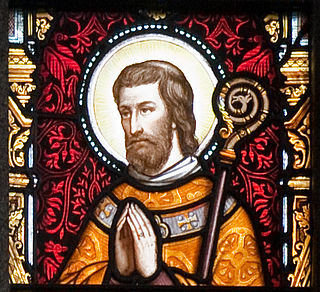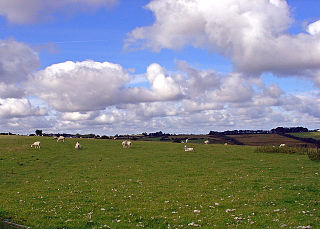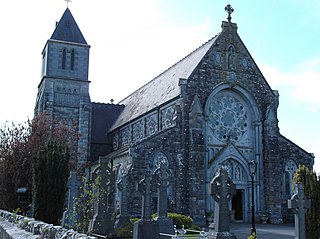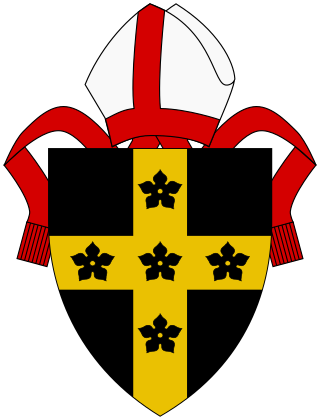Related Research Articles
Asser was a Welsh monk from St David's, Dyfed, who became Bishop of Sherborne in the 890s. About 885 he was asked by Alfred the Great to leave St David's and join the circle of learned men whom Alfred was recruiting for his court. After spending a year at Caerwent because of illness, Asser accepted.

Samson of Dol was a Welsh saint, who is also counted among the seven founder saints of Brittany with Pol Aurelian, Tugdual or Tudwal, Brieuc, Malo, Patern (Paternus) and Corentin. Born in southern Wales, he died in Dol-de-Bretagne, a small town in north Brittany.

Saint Máedóc of Ferns, also known as Saint Aidan, Saint Madoc or Saint Mogue, was an Irish saint who was the first Bishop of Ferns in County Wexford and the founder of thirty churches. His birth name was Áed, the name of the Irish god of the underworld, meaning "fire". The name Aidan is a diminutive form of Aed or Aodh, and was also a form of the Latin name Dominus. Máedóc and Mogue are other pet forms of Aed or Aodh, formed from the Irish affectionate prefix mo- and the diminutive suffix -óg, meaning "young", making for something like "my dear little Aodh".

Llanarth is both a small village and a community in Ceredigion, Wales. It is on the A487 road and is about 3 miles (4.8 km) from both Aberaeron and New Quay. The community includes the village of Synod Inn.

The Bishop of St Asaph heads the Church in Wales diocese of St Asaph.

The Bishop of Llandaff is the ordinary of the Church in Wales Diocese of Llandaff.

Saint Ailbe, usually known in English as St Elvis (British/Welsh), Eilfyw or Eilfw, was regarded as the chief 'pre-Patrician' saint of Ireland. He was a bishop and later saint.

Llanfaes is a small village on the island of Anglesey, Wales, located on the shore of the eastern entrance to the Menai Strait, the tidal waterway separating Anglesey from the north Wales coast. Its natural harbour made it an important medieval port and it was briefly the capital of the kingdom of Gwynedd. Following Prince Madoc's Rebellion, Edward I removed the Welsh population from the town and rebuilt the port a mile to the south at Beaumaris. It is in the community of Beaumaris.
John Richards Richards was an Anglican bishop and author during the third quarter of the 20th century.

The Bishop of St Davids is the ordinary of the Church in Wales Diocese of St Davids.

Saint Teilo, also known by his Cornish name Eliud, was a British Christian monk, bishop, and founder of monasteries and churches. He was from Penalun (Penally) near Tenby in Pembrokeshire, south Wales.
The Synod of Chester was an ecclesiastical council of bishops held in Chester in the late 6th or early 7th century. The period is known from only a few surviving sources, so dates and accounts vary, but it seems to have been a major event in the history of Wales and England, where the native British bishops rejected overtures of peace from Augustine's English mission. This led directly to the Battle of Chester, where Æthelfrith of Northumbria seems to have killed the kings of Powys and (possibly) Gwynedd during an attack on the ecclesiastical community at Bangor-on-Dee.
Ffernfael ab Idwal or Ithel was a late 8th-century king of Gwent in southeast Wales.
Sadyrnfyw or Sadwrnfen the Generous was a bishop of Meneva in medieval Wales.
Nobis or Novis is traditionally considered to have been a bishop of Meneva in the medieval Welsh kingdom of Dyfed.
Morfyw was bishop of Bangor from c. 904 to 944 and bishop of Meneva for about one year around 945.
Rhydderch was a 10th-century bishop of Meneva.
Einion ab Owain was a medieval Welsh prince of the House of Dinefwr. He was the eldest son and probable edling of King Owain of Dyfed, son of Hywel Dda.
Saint Fiachra was the Bishop of Armagh, Ireland from 548 to 558.
Mordaf was a bishop in Wales during the 10th century.
References
- 1 2 Annals of Wales (B text), p. 10.
- 1 2 Plumber, Charles. The Life and Time of Alfred the Great . 1902. Accessed 18 Feb 2013.
- ↑ St. David's Cathedral. "Past Bishops & Deans". Accessed 18 Feb 2013.